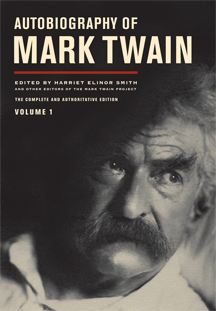By Lewis Fried
This work is both an autobiography as well as Mark Twain’s multiple attempts to create one. Beginning in 1870, he had grappled with how to present his life. In fact, the Autobiography makes us ask how does anyone present a life out of the booming, buzz-saw of personal experience, to paraphrase William James? As Twain points out, in “An Early Attempt,” his repeated tries to compose the work along chronological lines, from cradle onwards, were unsatisfactory; they gutted the work of “side-excursions” which he believed were the quickening nature of “our life-voyage.”
Twain met this challenge by surrendering to it. He began several dictations, at various places, that were summonings of his memory. In no particular order, his sketches were reflections of and on the moment. Write about what comes up. Abandon it when it begins to “pale.” Try to combine “Diary and Autobiography.” As a result, the Autobiography is a dialogue between the older Twain and his memory of the younger. We are watching the making of his self, as well as his persona, always in process, always in revision: a palimpsest. Twain offers us what the experiences of his life meant to him, both when he was “younger,” and when he had time to understand them. Read this volume as memoir, with all that the term implies ─ a triumph of memory and emotion over what otherwise would have been chronological, hollow events.
Twain’s victory arrests us for another reason as well; he demonstrates the capacities of clear American diction. Think of the then-contemporary attempts to create a prose suitable for American modernity: for examples, the rush of orotund language in Walt Whitman’s essays, the ponderous rhetoric of Theodore Dreiser’s novels, the tendentious phrasing of Henry James. And yet, here is Twain, speaking in a beguilingly simple voice (though hardly “artless,” for it was one developed through his years of journalism, public speaking, and plain-languaged novels) striking a major note with almost every reflection. In short, the book is a delight to read.
There is a great strength to the Autobiography. He was determined to write as candidly as possible, without fear or favor. The work , he points out, will be a speaking from the dead; he would be in his grave when the book was printed. And he does write without varnish. There are bitter remarks about those who made his life hard; the steely portraits of those he disliked; the magnetic and warm sketches of those he loved and those he admired, and the yearning for those he helped bury.
Do we learn anything new from the Autobiography, anything so startling that we have to go back and re-read his works, reconsidering the authority of his voice? Have we gotten him wrong? The answer is no, at least judging from this first volume of the work which takes us to 1906. However, do we now have the chance to affirm that we have gotten him “right”? The answer is yes. Like many of his protagonists, he despised a civilization calling itself moral yet dedicated to lies and the butchery of war. He hated the moral veneer of a savage American yellow journalism. He had contempt for what belittled others. Call him a moral patriot. You would not be wrong. His justifiable cynicism, revealed in almost every novel he wrote, was a judgment upon an America that had abandoned its ideals, yet a country that he loved.
Yet, there is a boundary. For all the desire to address those beyond his grave, and the strident desire for transparency, there is little in this volume that would change our opinion of him. There is so little that strikes us as deeply confessional. In the Autobiography, he mentions the difficulty of anyone revealing a full life. Maybe his mind worked, as his satires, in broad strokes; perhaps he was obedient to what he praised as the moral character of his wife’s judgment; possibly he was genuinely unable to grapple with himself. More to the point, his presentation of his self may well be what it really was—at least in his eyes. In his Confessions, Jean-Jacques Rousseau had dared the reader to be more honest than he; we will have to say that Twain was as revelatory as he could be.
Nevertheless, adding recollection to recall, piling memory upon the memorable—these do not make so much for an understanding of Twain as they do indicate the architecture of his mind: what the triggers were for his recall of events. But why stretch an argument? The writing is brilliant, the details are rich, and Twain’s voice is strong.
Lewis Fried (ΦBK, Queen’s College, CUNY, 1964) is Professor of English Emeritus at Kent State University and a resident member of the Nu of Ohio chapter of Phi Beta Kappa.




